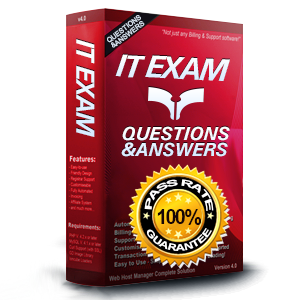
2V0-72.22 Exam Questions & Answers
Exam Code: 2V0-72.22
Exam Name: Professional Develop VMware Spring
Updated:
Q&As: 60
At Passcerty.com, we pride ourselves on the comprehensive nature of our 2V0-72.22 exam dumps, designed meticulously to encompass all key topics and nuances you might encounter during the real examination. Regular updates are a cornerstone of our service, ensuring that our dedicated users always have their hands on the most recent and relevant Q&A dumps. Behind every meticulously curated question and answer lies the hard work of our seasoned team of experts, who bring years of experience and knowledge into crafting these premium materials. And while we are invested in offering top-notch content, we also believe in empowering our community. As a token of our commitment to your success, we're delighted to offer a substantial portion of our resources for free practice. We invite you to make the most of the following content, and wish you every success in your endeavors.

Download Free VMware 2V0-72.22 Demo
Experience Passcerty.com exam material in PDF version.
Simply submit your e-mail address below to get started with our PDF real exam demo of your VMware 2V0-72.22 exam.
![]() Instant download
Instant download
![]() Latest update demo according to real exam
Latest update demo according to real exam
* Our demo shows only a few questions from your selected exam for evaluating purposes
Free VMware 2V0-72.22 Dumps
Practice These Free Questions and Answers to Pass the VCP-AM Develop 2022 Exam
Which two options will inject the value of the daily.limit system property? (Choose two.)
A. @Value("#{daily.limit}")
B. @Value("$(systemProperties.daily.limit)")
C. @Value("$(daily.limit)")
D. @Value("#{systemProperties[`daily.limit']}")
E. @Value("#{systemProperties.daily.limit}")
Which option is true about use of mocks in a Spring Boot web slice test? (Choose the best answer.)
A. Mocking a Spring Bean requires annotating it with @MockBean annotation.
B. If a Spring Bean already exists in the web slice test spring context, it cannot be mocked.
C. Mocks cannot be used in a Spring Boot web slice test.
D. Mocking a Spring Bean requires annotating it with @Mock annotation.
Refer to the exhibit.

The above code shows a conditional @Bean method for the creation of a JdbcTemplate bean.
Which two statements correctly describe the code behavior? (Choose two.)
A. @ConditionalOnBean(name= "dataSource") should be replaced with @ConditionalOnBean (DataSource.class) for greater flexibility.
B. @ConditionalOnBean(name= "dataSource") should be replaced with @ConditionalOnMissingBean (DataSource.class) for greater flexibility.
C. The @Bean annotation should be removed.
D. A JdbcTemplate bean will be created when the DataSource class is in the classpath but there is no DataSource bean.
E. A JdbcTemplate bean will be created when a bean named dataSource has already been created.
Which two statements are correct regarding Spring Boot auto-configuration customization? (Choose two.)
A. Use the @AutoConfigureAfter or @AutoConfigureBefore annotations to apply configuration in a specific order.
B. Disable specific auto-configuration classes by using the exclude attribute on the @EnableAutoConfiguation annotation.
C. Provide customized auto-configuration by subclassing the provided Spring Boot auto-configuration classes.
D. Enable component scanning within auto-configuration classes to find necessary components.
E. Control the order of auto-configuration classes applied with @AutoConfigureOrder.
Which statement is true about the @PropertySource annotation? (Choose the best answer.)
A. Used to designate the location of the application.properties file in a Spring Boot application.
B. Used to easily look up and return a single property value from some external property file.
C. Used to designate the file directory of the application.properties file in a Spring Boot application.
D. Used to add a set of name/value pairs to the Spring Environment from an external source.
Viewing Page 1 of 3 pages. Download PDF or Software version with 60 questions

